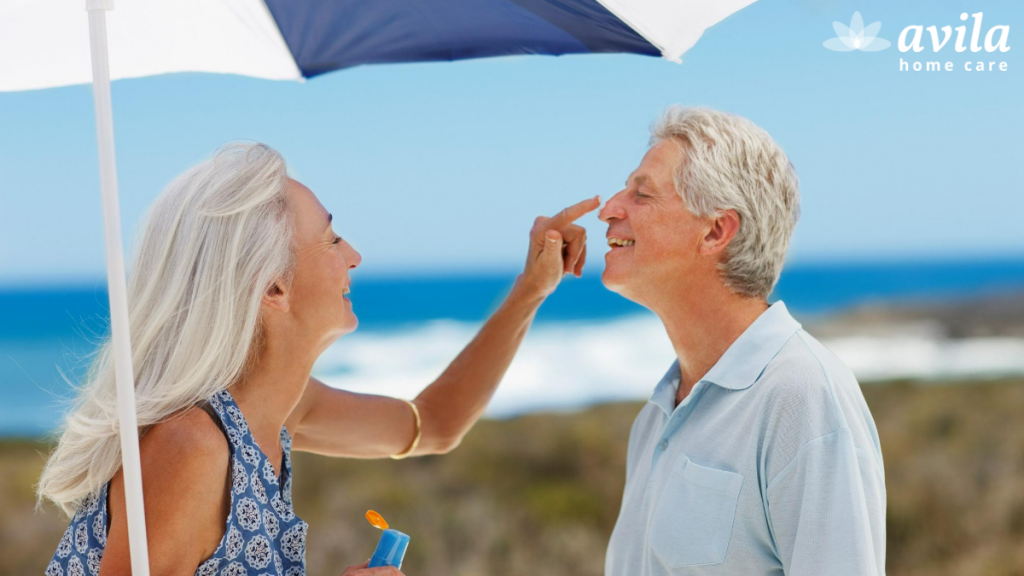Why Seniors Need UV Protection

Seniors may be tempted to forego sun protection during the summer months—after all, if they were going to develop skin cancer, they would have by now, right? Unfortunately, this is not the case, and sun protection is critical at all ages. Here the home care providers at Avila Home Care detail the importance of UV protection for seniors and best practices for protecting your skin from harsh summer rays.
Skin Cancer and Skin Cancer-Related Deaths are Prevalent in Seniors
Skin cancer develops from an accumulation of sun damage over time, which means that seniors are more susceptible to developing skin cancer. This is true even if they have not had a sunburn or a tan in a significant amount of time. More than half of skin cancer-related deaths occur to those who are 65 or older. Even just one sunburn as a senior could set your skin over the edge, allowing skin cancer to develop.
Sun Damage is Harmful at All Ages
While it was once believed that the sun damage you sustain before the age of 18 is the main contributor for skin cancer and sun damage, we now know that this isn’t the case. Approximately 23% of the sun damage you will develop over a lifetime develops by the age of 18, however, the average individual develops 10% more sun damage each decade. This means that the time period between ages 50 and 80 will allow for a larger accumulation of sun damage than the time before the age of 18.
UV Protection Does Not Have to Be Difficult
There are many easy, straightforward ways to protect your skin from the harmful effects of ultraviolet (UV) rays, many of which do not include the use of sunscreen. The hours between 10:00 am and 2:00 pm are when the sun’s rays are at their strongest. If possible, avoid outdoor activity during this time. Hats, long-sleeved shirts, pants and sunglasses all provide sun protection as well. Choose fabrics in lighter materials, such as cotton and linen, to stay cool. Seek shade when outdoors, particularly during the middle part of the day.
Studies have also shown that caffeine, when consumed prior to sun exposure, can help limit the body’s development of skin cancer cells. Foods such as salmon, red wine and sweet potatoes also have a protective effect for the skin.
Sunscreen also provides important protection when spending time in the sun. When choosing a sunscreen, look for broad-spectrum protection—this helps to protect against both UVA rays, which cause skin aging, and UVB rays, which contribute to the development of skin cancer. Sunscreen should always have at least an SPF of 30, and it is important to remember that sunscreen labelled “water resistant” does not mean the product is waterproof. Sunscreen should always be reapplied after spending time in the water. In addition to wearing the proper sunscreen while outdoors, it is also advisable to have your skin routinely checked by a dermatologist or other health care professional to ensure your skin is healthy and cancer-free.
Enjoy Your Summer Safely with the Home Care Professionals at Avila Home Care
Summer is a time for outdoor fun, but being mindful of sun damage is still important. The dedicated care providers at Avila wish you a happy summer season, and seek to empower their clients with knowledge and care that helps them to live out their golden years to the fullest. To learn more, contact Avila Home Care today!
Donald Ely is Avila’s Caregiver of the Month for February, 2025!
Avila Home Care is honored to recognize Donald Ely as February 2025 Caregiver of the Month for his outstanding care and dedication! A recent client praised Donald’s patience, kindness, and excellent communication. “I have nothing but wonderful things to say about my father’s caregiver, Donald Ely. For the past four months he has shown such…
How to Manage Seasonal Affective Disorder While Aging in Place
Many elderly people are susceptible to “the winter blues,” more formally known as seasonal affective disorder (SAD). Fortunately, there are ways to counteract the effects of this condition, and maintain high spirits during the dreary winter months. Here, the home care providers at Avila Home Care explain how to manage the symptoms of SAD. Seasonal…
Nora Margani is Avila’s Caregiver of the Month for August, 2022!
Nora is an exceptional Caregiver- she cares deeply for her Avila clients and understands their needs. Nora is the consummate professional and is incredibly thorough when she provides care. She is communicative and detail-oriented. We are very fortunate to have Nora on the Avila Home Care team- congratulations!



